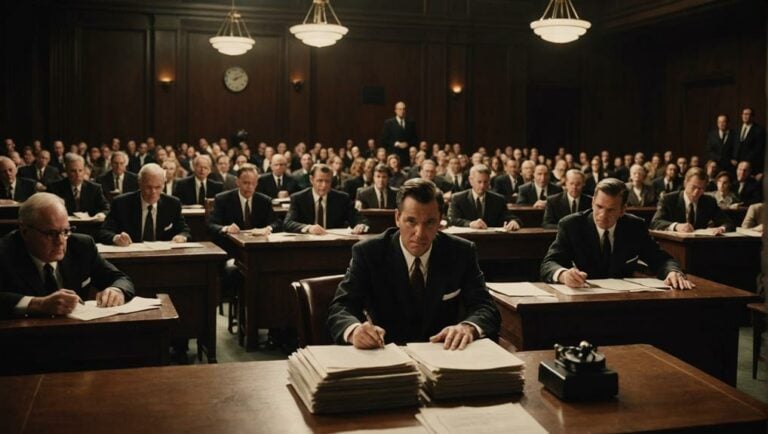During the Cold War, McCarthyism ignited a fervent hunt for alleged Communists in America, driven by fear and paranoia.
This era of intense scrutiny and persecution, marked by Senator Joseph McCarthy's unsubstantiated claims, left a lasting impact on civil liberties and U.S. policy.
Origins and Factors
McCarthyism originated from a confluence of Cold War anxieties, President Truman's Executive Order 9835, and the cultural backdrop of the First Red Scare. With the Cold War escalating, fears of communist infiltration in America grew.
In 1947, President Truman's Executive Order 9835 mandated loyalty screenings for federal employees, aiming to root out communist sympathizers. This order set the stage for McCarthyism, as it institutionalized suspicion and led to widespread investigations.
Senator McCarthy capitalized on these fears, making unsubstantiated accusations that communists had infiltrated various sectors of American society. His claims, often lacking concrete evidence, fueled widespread fear and paranoia.
The cultural memory of the First Red Scare—when Americans were similarly gripped by anti-communist sentiment—resonated strongly during this period, amplifying the public's anxiety.
Targets of McCarthyism included government employees, entertainers, academics, politicians, and union activists. These loyalty screenings and accusations often led to loss of employment and ruined careers, instilling fear in American society.
The unsubstantiated accusations and the resulting hysteria created an atmosphere where mere suspicion could destroy lives, reflecting the intense Cold War tensions of the time.
Key Figures
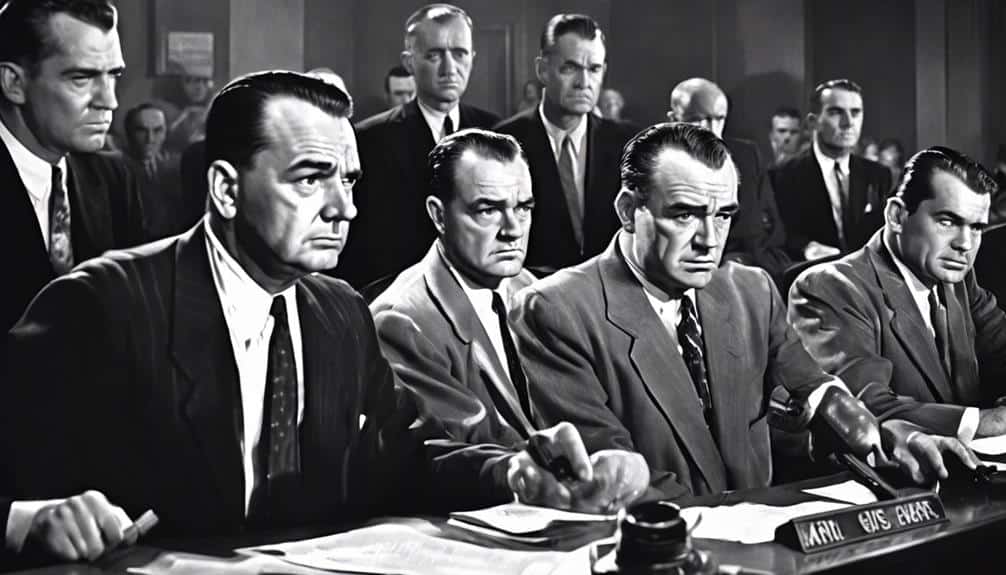
Senator Joseph McCarthy, who spearheaded the anti-communist crusade in the 1950s, became the most notorious figure of this era, exploiting Cold War fears to gain political power. His infamous claim of having a list of 205 card-carrying Communists in the U.S. Department of State ignited widespread paranoia.
McCarthy's investigations extended beyond government employees, targeting the entertainment industry and academia, resulting in many ruined careers and widespread blacklisting. The House Un-American Activities Committee (HUAC) played an essential role in this witch hunt, conducting aggressive inquiries to root out alleged communist sympathizers.
McCarthy's relentless pursuit of perceived disloyalty among U.S. citizens intensified during the Army-McCarthy hearings in 1954. These hearings were pivotal in revealing the senator's coercive tactics and lack of substantial evidence. Public opinion shifted dramatically as these hearings were broadcast, exposing the baseless nature of many of McCarthy's accusations.
Consequently, the U.S. Senate censured McCarthy, leading to his political downfall and marking a decline in McCarthyism. This period remains a cautionary tale of how fear and suspicion can undermine democratic principles and civil liberties.
Targets and Persecution
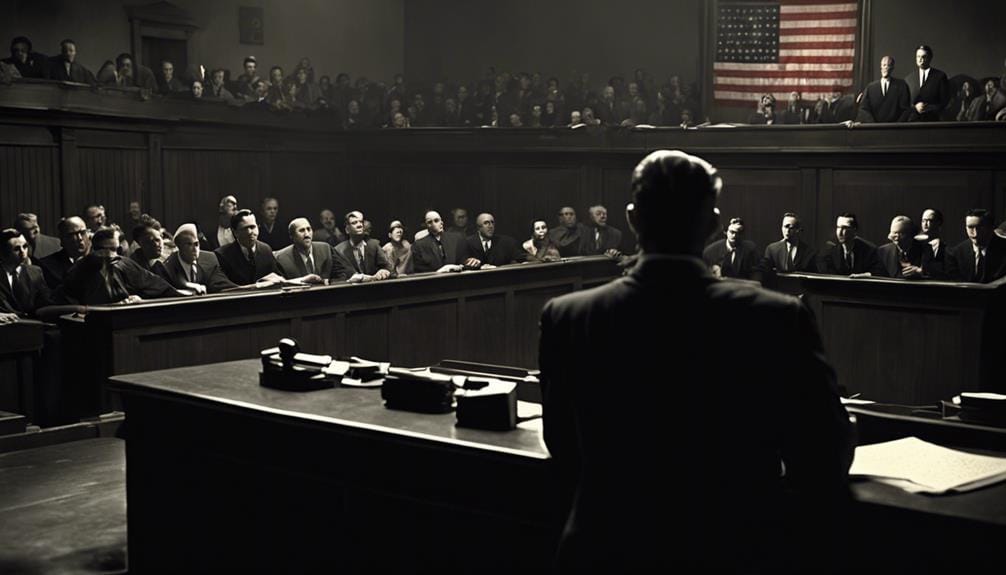
Government employees, entertainers, academics, and other individuals faced severe persecution during the McCarthy era due to unsubstantiated accusations of communist sympathies. This period, known as McCarthyism, saw Senator Joseph McCarthy and the House Un-American Activities Committee (HUAC) spearhead a witch hunt that targeted alleged communist sympathizers.
The persecution often had dire consequences. Government employees lost their jobs, entertainers were blacklisted from the industry, and academics faced professional ostracism. Careers were ruined based on mere suspicion, with little to no concrete evidence. The fear of being labeled a communist sympathizer created an atmosphere of paranoia and distrust in American society.
Many individuals weren't only professionally marginalized but also legally prosecuted. Some faced imprisonment, further exacerbating the personal and social turmoil brought on by McCarthyism. The witch hunt extended beyond public figures to include union activists and ordinary citizens, reflecting the widespread nature of the persecution.
McCarthyism's impact was profound, instilling fear and anxiety across the nation. The relentless efforts of McCarthy and HUAC to root out alleged communists led to a significant crackdown on perceived communist activities, leaving a lasting legacy of fear and injustice.
Investigative Institutions
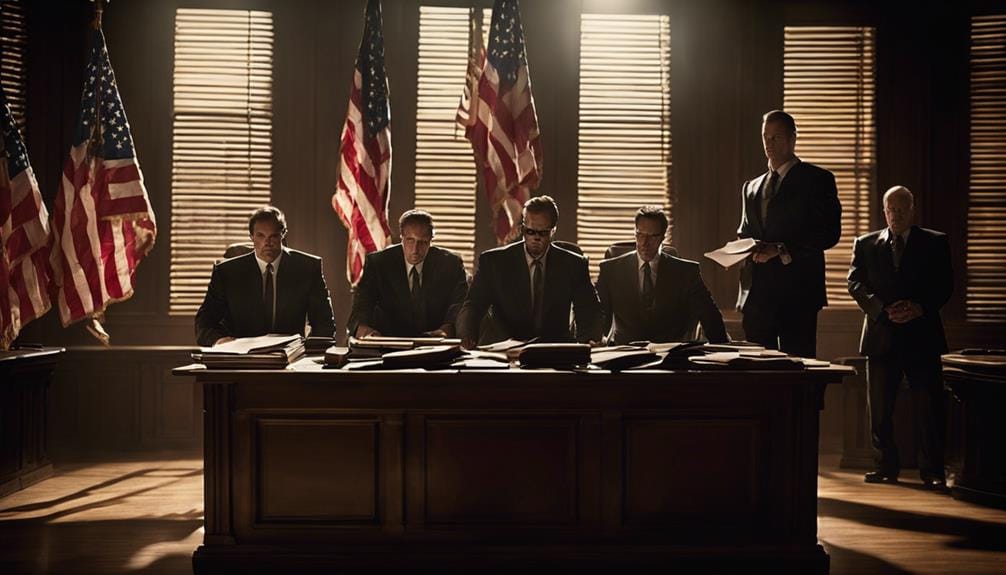
Numerous investigative bodies, particularly the House Un-American Activities Committee (HUAC), spearheaded efforts to uncover alleged communist infiltrators in various sectors of American society. HUAC, a congressional committee, conducted high-profile investigations into subversive activities, often targeting Hollywood, labor unions, and the government. These investigations aimed to expose and eliminate communist sympathizers who were perceived as threats to national security.
The FBI, under the leadership of J. Edgar Hoover, played an essential role in loyalty-security programs designed to root out suspected communists. Hoover's FBI employed a range of covert tactics, including illegal wiretaps, burglaries, and surveillance operations, to gather intelligence on individuals and organizations suspected of subversive activities. These actions were often justified by the perceived need to protect the nation from communist infiltration.
COINTELPRO, a series of covert FBI projects, aimed to disrupt and discredit communist sympathizers through methods like planting forged documents, spreading rumors, and leaking damaging information. These tactics were intended to undermine the credibility and influence of suspected individuals and groups.
Legislative Actions
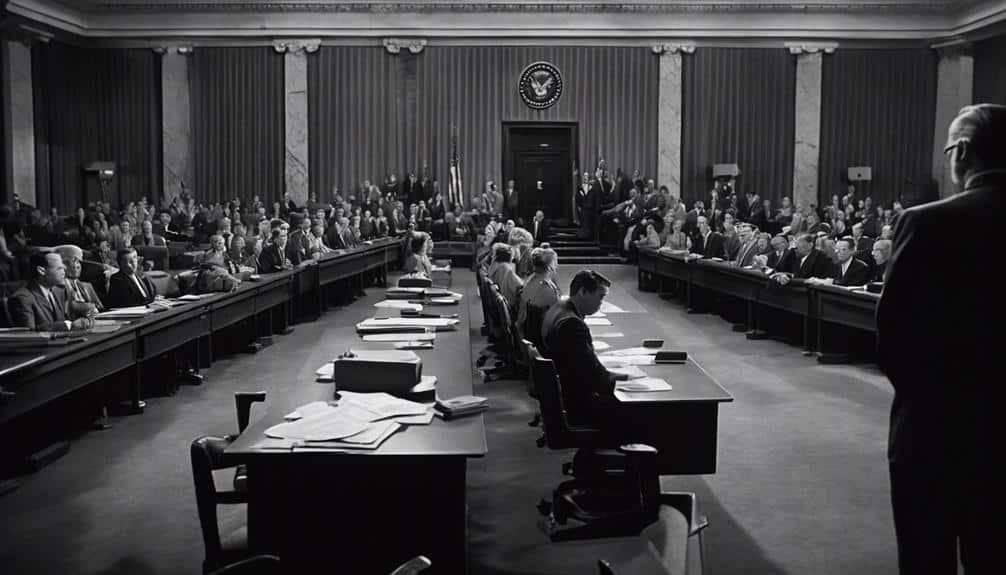
You'll find that the legislative actions during McCarthyism, such as the Subversive Activities Control Act of 1950, aimed to combat perceived communist threats but had significant implications for civil liberties.
These laws justified loyalty programs and security checks for government employees, often infringing on First Amendment rights.
The impact of these measures extended beyond government, leading to widespread blacklisting and denial of due process for many accused individuals.
Anti-Communist Legislation Enacted
In response to perceived threats of communism, a series of legislative actions were enacted to curb communist influence in America. These measures aimed to address concerns over national security and prevent the spread of communist ideology within the U.S. government and society.
Key legislative actions included:
- Smith Act of 1940: This law criminalized advocating the violent overthrow of the government. It was a fundamental tool used to prosecute alleged communists.
- Communist Control Act of 1954: This act declared the Communist Party of the United States to be a subversive organization, effectively outlawing it.
- Hatch Act of 1939: This legislation restricted political activities of federal employees to prevent communist influence in governmental operations.
- Levering Act: A state-level law in California that targeted communist activities in various sectors and institutions.
Additionally, loyalty oaths and loyalty review boards were established to guarantee government employees' allegiance and to identify and remove suspected communists.
These measures were part of a broader strategy of anti-communist legislation designed to fortify national security during a time of heightened Cold War tensions.
Impact on Civil Liberties
The legislative actions taken during McCarthyism, such as the Smith Act and the Communist Control Act, significantly curtailed civil liberties by restricting freedom of speech, association, and due process. The Smith Act, passed in 1940, criminalized advocating the violent overthrow of the government, which the Department of Justice used to prosecute members of the Communist Party. The Communist Control Act of 1954 went further by outlawing the Communist Party entirely, notably hampering individuals' First Amendment rights.
In addition to these laws, the House and Senate established loyalty review boards to assess the allegiance of government employees. These boards, often implementing loyalty oaths, pressured individuals to conform to anti-communist sentiments or risk losing their jobs. Such measures undermined the fundamental right to hold differing political views, a cornerstone of democratic society.
The cold war climate fostered an environment where due process was frequently overlooked. Allegations of communist affiliations led to blacklists, especially in industries like entertainment, where individuals were barred from employment based on suspected political beliefs. This not only violated civil liberties but also created a culture of fear and conformity, starkly opposing the principles of freedom and justice.
Blacklists and Repercussions
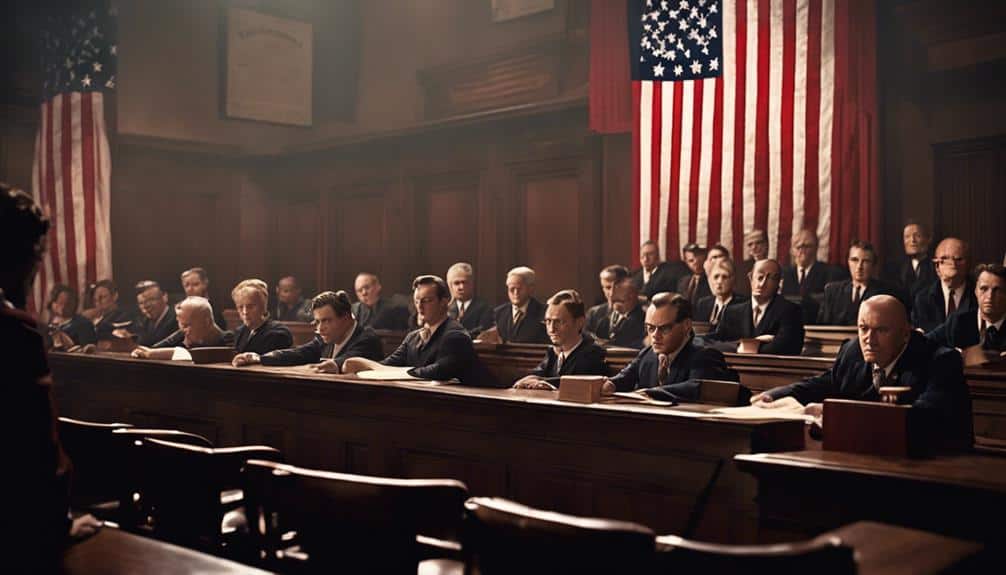
Blacklists in the McCarthy era systematically targeted alleged communists, leading to severe personal and professional consequences for those named. These blacklists were particularly pervasive in industries like entertainment, where the Hollywood blacklist became infamous.
Here's what you need to know:
- Employment Loss: Blacklisted individuals faced immediate job loss and struggled to find employment in their respective fields.
- Social Ostracism: Being on a blacklist often led to social isolation and public disgrace.
- Government Security Checks: Those named faced intrusive government security checks, adding to their difficulties.
- Self-Censorship: The fear of being blacklisted led many to self-censor and conform to avoid suspicion of communist sympathies.
The Hollywood blacklist affected over 300 individuals, many of whom were forced into exile or had to work under pseudonyms. The repercussions weren't just professional; they extended into every aspect of the individuals' lives.
The constant threat of government security checks created an atmosphere of fear and suspicion, making it nearly impossible for those blacklisted to rebuild their careers or lives. This environment of fear caused widespread self-censorship, as people sought to conform to avoid the stigma of being labeled a communist.
The ripple effect of these blacklists extended far beyond those directly named, altering the cultural and political landscape of the era.
Decline of McCarthyism
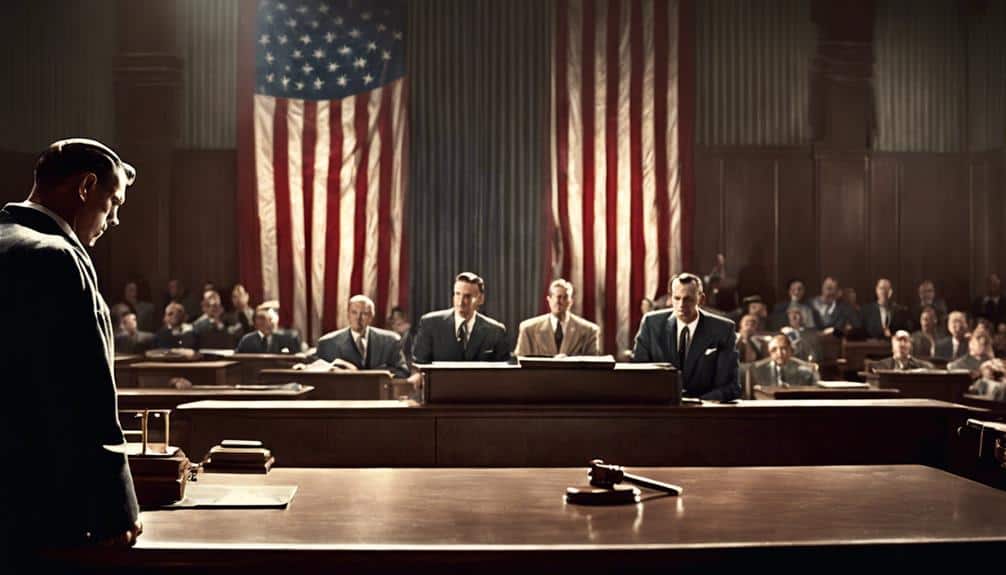
Public disillusionment with Senator McCarthy's aggressive tactics and lack of credible evidence marked the beginning of his decline in the mid-1950s. As the public grew weary of his baseless accusations and the climate of fear he fostered, McCarthy's influence began to wane.
A significant factor in this decline was the U.S. Supreme Court's intervention. Under the leadership of Chief Justice Earl Warren, the Court overturned several key laws associated with McCarthyism, thereby weakening its grip on American society.
The term 'McCarthyism' evolved to signify reckless accusations and unjust persecution, which further eroded public support. As the Cold War tensions that fueled McCarthy's rise started to subside, so did the pervasive fear of communism that had gripped the nation. This diminishing fear contributed to the overall decline of McCarthyism.
Despite its fall from prominence, the legacy of McCarthyism continues to shape modern political discourse and historical perspectives. The era serves as a cautionary tale about the dangers of unfounded accusations and the impact of unjust persecution on individuals and society.
Understanding this decline is essential for grasping the full scope of McCarthyism's influence on American history.
Lasting Impact
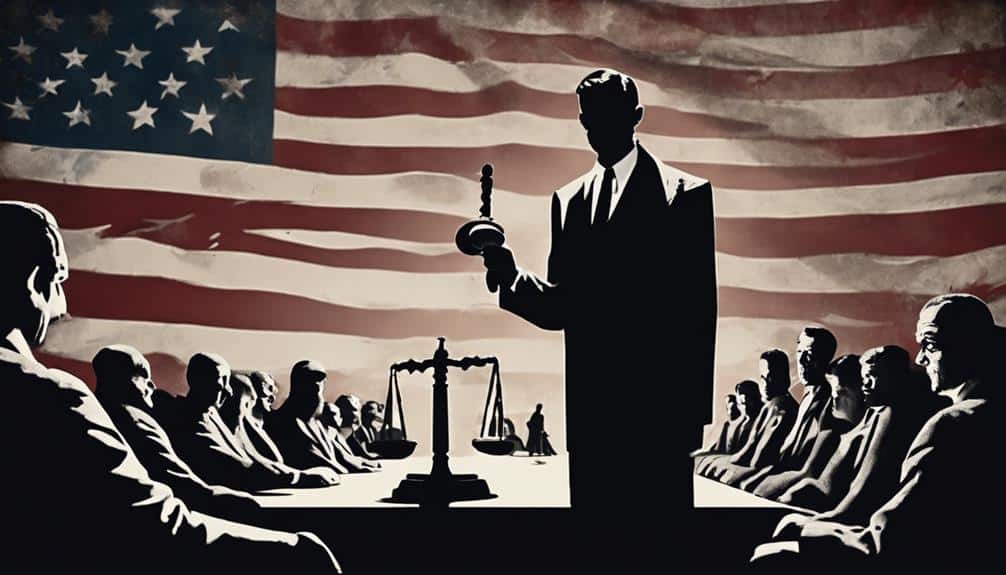
McCarthyism's legacy on civil liberties is evident in the way it shaped modern political discourse and impacted U.S. policy.
You'll see how the era's tactics of guilt by association and unsubstantiated accusations still resonate in contemporary debates over government overreach and individual rights.
The Supreme Court's intervention to uphold civil liberties marks a pivotal shift that continues to influence legal standards today.
Legacy on Civil Liberties
The legacy of McCarthyism has left a deep stain on civil liberties, eroding due process rights and First Amendment freedoms significantly. Under the influence of Senator Joseph McCarthy, the U.S. government engaged in practices that severely compromised the civil liberties of countless individuals.
The period was marked by:
- Erosion of due process rights: Accused individuals were often denied fair trials and the opportunity to defend themselves.
- First Amendment violations: Freedom of speech and association were trampled as people were persecuted for their political beliefs.
- Blacklisting: Countless individuals faced career destruction and social ostracism without concrete evidence or proper legal procedures.
- Supreme Court intervention: The Court played an essential role in eventually curbing the excesses of McCarthyism, highlighting the need to uphold constitutional protections.
McCarthy's actions led to a climate of fear where accusations alone could ruin lives. The Supreme Court's involvement underscored the importance of maintaining checks and balances to prevent government overreach. This era serves as a stark reminder that protecting civil liberties is vital, even in times of political hysteria, to guarantee justice and freedom for all.
Modern Political Discourse
While the legacy of McCarthyism eroded civil liberties in the past, its influence on modern political discourse serves as a powerful reminder of the perils of unchecked power and baseless accusations.
Today, the term 'McCarthyism' is often invoked to describe reckless accusations and political witch hunts. This historical reference underscores the importance of protecting civil liberties and ensuring due process in contemporary politics.
In modern political discourse, the lessons from McCarthyism highlight the necessity of upholding democratic values, such as transparency and accountability, within government actions. The dangers of fear-mongering and the erosion of these values remain pertinent, as demonstrated by ongoing references to McCarthyism in Supreme Court decisions and public debates.
These references serve as critical reminders of the destructive potential of unchecked power.
Impact on U.S. Policy
Shaping loyalty standards and procedures in government agencies, the era of McCarthyism left a lasting imprint on U.S. policy. This period saw the implementation of stringent loyalty checks and security measures that continue to influence how the government operates today. Agencies like the State Department were particularly affected, as federal employees faced intense scrutiny under the Loyalty Review Board.
- Internal Security: Heightened focus on national security led to the suppression of dissenting political views.
- Foreign Policy: Fear and accusations of communism influenced diplomatic relations and foreign policy decisions.
- Civil Liberties: The legacy of McCarthyism underscored the importance of protecting civil liberties and due process in government actions.
- Loyalty Oaths: The aftermath prompted reevaluation of loyalty oaths and security measures within the U.S. government.
The House Committee on Un-American Activities and similar bodies played pivotal roles in enforcing these policies. Their actions created a culture of fear and suspicion, significantly impacting federal employees.
The Internal Security measures not only targeted alleged communists but also stifled political discourse and dissent.
The reevaluation of loyalty oaths and security protocols was a direct response to the excesses of this era, highlighting the need for balance between security and civil liberties.
Understanding this period's lasting impact helps you appreciate the delicate balance between national security and individual rights in current U.S. policy.


